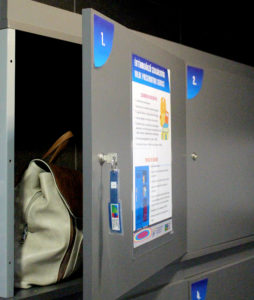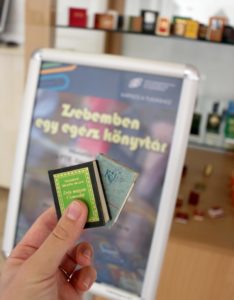Welcome! The fall is here again and the academic year has begun! With this post, we would like to welcome the university students and future library readers and provide them a brief guide regarding our library services.
We encourage our readers not to postpone the exploration of the library. The sooner you get to know our buildings and services and the sooner you discover the shelves, the easier it will be to complete the semesters one after the other.
Registration – the first step
Registration is done in person at the given library by signing the entry declaration. In exceptional cases, it is possible to register and loan via proxy by submitting the completed authorization form.
In order to have a successful registration, you will need the following:
- an identity document (identity card, passport or driving license);
- your address card;
- and your NEPTUN code.
Registration is completely FREE for the students of the University of Pécs. Once you have your library card, you will have access to all the services of the Centre for Learning.
Submit your registration online by clicking here.
IMPORTANT!

If you have a valid Neptune code, after registration you can access the databases that the University of Pécs has subscribed to and you can use the library’s online services from home.
Online registration does not equal to personal registration! So if you want to loan books, first you have to register in person. If you have already registered online, please let our colleague know.
For further information about registration, visit our website.
Loaning – take the books home!
If your library ticket is valid, the next step is to find the documents among the shelves.

You can loan the documents directly from the librarian at the circulation desk in the “traditional” way, or you can use our self-service loaning machines. All you have to do is put the books on the machine then scan your library card and enter your password (the month and day of your birthday, eg. 0509) and take them home.
By clicking here, you can log in to your “Reader data” account using your library card number and password (birth month and day, eg. 0509). Check the due dates of your documents, renew them and settle the debts online if there is any.
TIP: Add the date to your Google calendar, so you will see the loan date of the book. If you fail to return it on time, you have to pay the late fee.
For what else can I use Reader data?
Check out this video on how to use your account – it might help you a lot before logging in the first time.
Tips for easy loaning:
Tip 1: Use our Corvina catalogue (OPAC)!
Search in the catalogue at home or in the library at our designated computers.
Why use the catalogue?
- You can check if there’s a loanable copy of the book or not

- Find out the pressmark (shelfmark), which will help you find the book much faster
- Set filters so that you can search for a book in a specific faculty library
- With help of Advanced Search, you can find the books you need based on a variety of criteria
Tip 2: Discover the building
After prior registration, we await the application of groups for library tours in the Knowledge Center during which we present the building and the library’s services in 35-45 minutes and answer the visitors’ questions. The tour is extremely useful for first-year students. If you would like to discover the floors of the building on your own, here is a little help on what you can find and where:
1st floor: literary studies, linguistics, Hungarian literature, foreign literature
2nd floor: computer science, philosophy, psychology, religion, social sciences, natural sciences, applied sciences, arts, sports, geography, history
3rd floor: economics, statistics, law, marketing, management
4th floor: fairy tales, children’s novels, children’s and youth non-fiction, sheet music, books on music, music CDs, vinyl records, youth novels
Lockers on the second floor

If you are a registered reader, you can use the library lockers for free. The key to the lockers can be requested at the loan desk on the 2nd floor. Lockers can be rented no later than the given day, until closing. The key must be returned to the loan desk before closing; if this does not happen, your library card will be blocked, during which the library services will not be available. Learn more here.
Services – because the library is much more than books!
These services might be very useful if you prepare for an assignment, write your thesis or hunt for relevant literature for a group task. The following are such services and databases that you can access from the comfort of your home. Since they are 100% reliable sources, the references and articles you find here will be proper.
1. Storage request from home
Not everyone knows that 40% of the documents in the Knowledge Center are found on the shelves of the reading hall, while 60% are in the storage warehouse. However, they are also available to readers, as they can be requested for local use or loaning.
For further information on this service, visit this website.
2. Databases
Library databases are usually websites that contain full-text content journals and e-books with the feature of advanced searching. These websites contain reliable, verified information and help you find what you are looking for as quickly as possible.
You can find a number of databases on our website via this link.
 Subscribed databases are not only available from the library or the premises of the University of Pécs, but can also be used remotely from the comfort of your home. There are several options for remote use that are described here.
Subscribed databases are not only available from the library or the premises of the University of Pécs, but can also be used remotely from the comfort of your home. There are several options for remote use that are described here.
3. E-library
The library currently provides more than 8.000 e-books of 13 Hungarian publishers and 5.000 foreign publications. The works can be used without an e-book reader and without loaning and can be read immediately on the website or in .pdf format when opened. The collections do not cover the entire publishing portfolio, but contain a selection of works according to the higher education profile.
E-books can be accessed on or off campus. In the University of Pécs area (faculty, library or dormitory), books can be read through the university network (e.g. EDUROAM and wired internet) without prior login by clicking on the publisher’s address.
Outside the university’s domain, identification can be made either through a proxy or with a Neptun ID. For the latter, follow the instructions in the “remote access” section with the house icon after clicking on the speech bubble next to the publisher. (Neptun IDs are usually referred to by publishers as Shibboleth.)
4. Digitália
The digitalized documents of the university library are available for free on our website and our collection is constantly expanding with new books.
You can find Digitália here.
Documents protected by copyright can be accessed in the building of the Knowledge Centre and on the terminal computers located in the faculty libraries. Read more about terminal computers here.
5. If you need help, ask a librarian!
“Ask a Librarian!”
If you need more help, use the “Ask a Librarian!” service. It provides information on issues that require the help of a specialist librarian – be it guidance regarding literature or help with the location of certain books.
“Chat with a Librarian!”
Our Chat with a Librarian online service is available on weekdays between 8 am and 4 pm. With the live chat that is at the bottom right corner of our website, you can start instant messaging with one of our colleagues.
The library is a fun place!
Exhibitions, library programs, presentations
 We invite everyone to our exhibitions held in the building of the Knowledge Centre. Every month, we organize small exhibitions of books and objects related to anniversaries, world days and holidays of the given month in the vitrine located on the ground floor next to Registration. There are also special exhibitions, for example in September 2022, miniature books was in the spotlight.
We invite everyone to our exhibitions held in the building of the Knowledge Centre. Every month, we organize small exhibitions of books and objects related to anniversaries, world days and holidays of the given month in the vitrine located on the ground floor next to Registration. There are also special exhibitions, for example in September 2022, miniature books was in the spotlight.
In addition, visitors to the building can see a different exhibition every month on the ground floor or -1st floor. You can find information about the newest events and their openings on Facebook, as well as in the event calendar on our website.
If you are a student and your hobby is photography, painting, drawing or something creative, and you would like to exhibit your works in the Knowledge Center building, write us to info@lib.pte.hu.
Faculty libraries
By now, hopefully, you know a LOT more about the library than 5 minutes ago and you are motivated to discover the buildings and be a member of the library! A little help on your way:
- Faculty of Health Sciences Library
- Geographic Special Library
- German Library and University of Pécs Austrian Library
- Library of Engineering and Information Technology
- Library of the Faculty of Music and Visual Arts
- Pekár Mihály Library of Medicine and Life Sciences
- Social Science Technical Library
- Tóth József Faculty Library of Humanities and Sciences
- Faculty of Health Sciences Library Kaposvár Campus Library
- Faculty of Health Sciences Library Szombathely Campus Library
- Faculty of Health Sciences Library Zalaegerszeg Campus Library
- University of Pécs, Library of Faculty of Cultural Sciences, Education and Regional Development
One of our library systems is the Central Library (University of Pécs Library and Centre for Learning), located in the building of Knowledge Centre (Universitas street 2/A). This building also houses the Benedek Ferenc Library of the Faculties Law and Economics. The other faculty libraries are located in different parts of the city, mainly in the faculty buildings.
Another unit is the Historical Collection Department of the Central Library that – among others – is responsible for the collections of the Klimo Library and the University History Collection of Pécs. Come and visit the collections and have a look at the wonderful rooms of the Klimo Library and its maps and globes – some of which are older than 300 years (Pécs, Szepesy Street 3)!
Follow our library’s Facebook and Instagram pages that keep you up-to-date with the opening hours of our libraries, all the events, blog posts and current news.
Each faculty library also has its own Facebook page where you can find important information related to that unit.
Platforms and blogs where you can find up-to-date info and news
…And last but not least, don’t forget to subscribe to our newsletter here.



Leave a Reply